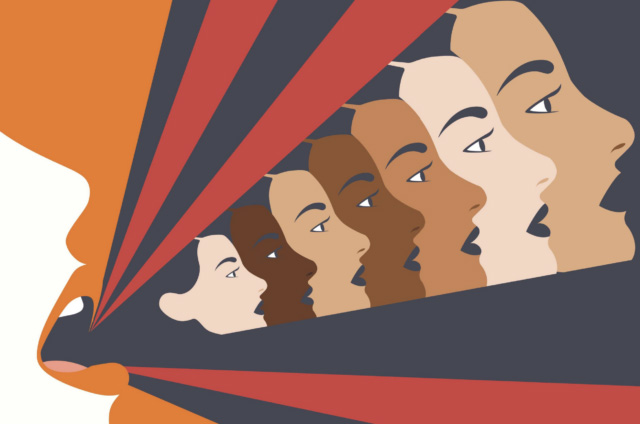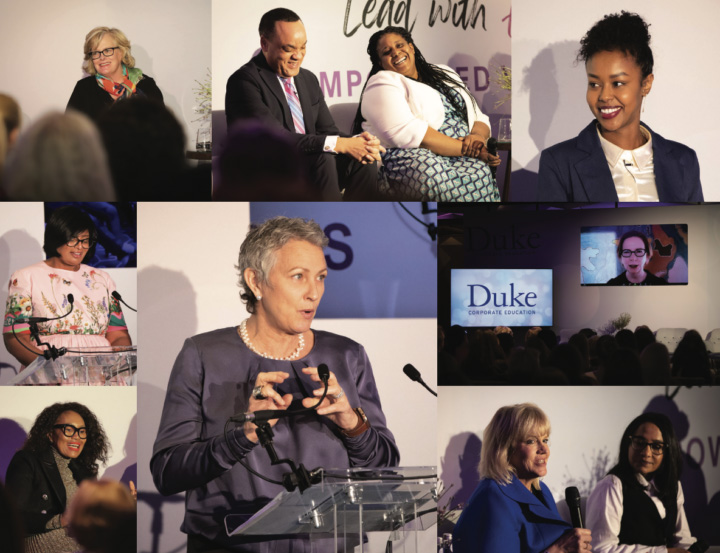When women raise their voices, change is irresistible. Together, we have the power to shape the future of our organizations.
As any student of the natural world will tell you, there is power in a pack. For women in today’s organizations, wherever they are in the world, it is more important than ever that we raise our voices and speak our truths – that we tell our stories, and are heard, together.
It is sometimes easy to feel that our individual circumstances are insignificant. But that both undervalues the worth that every woman holds as an individual, and overlooks the strength that lies in a collective. When our stories come together, as part of a greater whole, they come fully to life. They have the power to help unlock a change that I believe the world urgently needs: creating more true diversity, genuine inclusivity, and real equity for women.
For years, women have been working to win greater equality in organizations around the world – and real progress has been made. Global research by Grant Thornton suggests that the number of women in senior leadership roles reached 32% in 2022, up from 21% in 2012. But that level was only up one point compared to 2021. It is too early to say whether the pandemic has created a window of opportunity to accelerate women’s progress, as Grant Thornton suggests, or thrown up new barriers in the way of women fulfilling their potential in the workplace.
The reality is that women continue to face complex, deeply embedded challenges, and in some cases, new forms of oppression. It is imperative that we continue to work together. The strength of each of us combined enhances the collective strength of us all. When we bring in multiple views we support other women. We benefit from collaboration over competition.
Lift as you rise
One of the most important ideas that women can take with them as they gain seniority is that they have the power to help other women. The idea is simple. As the 19th-century American lawyer and orator Robert Ingersoll said, “We rise by lifting others.” That creates a responsibility that is the mission for us all today: lift as you rise.
As women, we can help each other to rise in leadership despite all of the systematic hurdles that may come our way. When we learn about each other – about women’s lived experiences and how they handled adversity and their own challenges – we can better see solutions to our own problems. We can use this learning to reframe some of the situations that we are in, and find ways to navigate through challenging environments.
When we share our stories, we are able to authentically connect with others. We can benefit from a network of well-connected women and an inner circle of close female contacts: those who act as sounding boards and sources of advice; who counsel and support us in tackling some of the unconscious biases that confront us; who encourage us to endure through challenging moments; those who act as mentors and sponsors, creating opportunities and opening doors. Reciprocal support can be incredibly powerful.
Your story is a gift. By sharing that gift with others you can help share valuable lessons, inspire others as they navigate their own challenges, and find opportunities to lift others as you rise.
Resilience and tenacity
When I look back at my own experience growing up in apartheid South Africa, I realize how the conditions that I railed against – leading to my expulsion from school – helped me develop traits such as courage and determination in the face of adversity, resilience and tenacity. And I learned the priceless lesson that, no matter how difficult things may look, we can find ways to deliver change for the better. My experiences also embedded in me a lifelong commitment to championing education as a great driver for improving equity in the world, especially for women. Education creates the chances needed for people to reach a better future. It is particularly important today, when we see how new technology is set to transform the economy – and it is vital for providing the foundations on which women’s success as leaders can be built.
Employers sometimes explain the relative absence of women in leadership roles by pointing to the relatively small pool of qualified candidates. That may be the case – but employers have a pre-employment obligation to help deepen that pool. They need to step up and work with education partners to build women’s access to learning, helping ensure girls and women stay in the education system for longer and inspiring them to make the subject choices that can set them up to succeed as part of the organizations of the future. That includes helping to redress the gender balance in technical disciplines that will be critical to the future, including science, technology, engineering and math.
Improving the inclusion of women can be a powerful driver of economic and social change. Maximizing our human capital and fulfilling the potential of our talents – as individuals, as organizations and as societies – will be one of the defining challenges of the coming decades.
Change is not linear
As we look to the future, it is essential that we remember that the path to equality for women is not linear. It never has been. Progress has been uneven and uncertain. That holds true again today.
In some parts of the world, women are more empowered than ever. But we also see evidence of a backlash – a resurgence of old ideas, about women’s place in the economy, their freedom of expression, their reproductive rights – often amplified through new channels. For all their benefits, the internet and social media have empowered some of the most ugly tendencies in society, creating new ways to abuse and oppress women. It sometimes seems like women can be attacked in the online world with impunity. It is corrosive, hurtful and damaging – and sometimes feeds real-world oppression too.
External shocks can set back progress too. The Covid-19 pandemic has had complex effects. For some women, working from home was empowering, improving their control over the blend of work with home life. But others have found themselves disadvantaged as their ability to hold a professional identity separate from the home has been eroded, and they have been forced to pick up more childcare duties. There has even been some evidence that hybrid working and online meetings suffer from the same old flaws experienced by women in real-world meetings – being spoken over and having their ideas claimed by others. As they lead their organizations through the new world of hybrid working, leaders need to be particularly aware of the potential impact on women.
Changing the face of leadership
In the face of today’s challenges, employers cannot stand on the sidelines. They need to stand by women and support them. That may mean backing those facing online trolling and cyber abuse, calling out microaggressions, helping women balance work and family life, or supporting those that are navigating the additional challenges of intersectionality that face women of colour, LGBTQ women, or disabled women.
This is an area where I again draw on my own personal story. As a younger executive I had a difficult experience at work. It was deeply hurtful, but I was fortunate. One of the board members I worked with saw what I needed and was supportive from start to finish while the situation was resolved. He was present for me. In such moments, allyship can make all the difference. With the right leader and the right mechanisms, we can get through difficult moments when they come up. Organizations need to set the standard – and leaders need to step up when the time comes.
But allyship is of course not just about crisis moments. It is about mentorship and sponsorship, supporting women in navigating their careers within our organizations; about finding and seizing opportunities for progression, in being seen as viable candidates for stretch appointments, and so on. I worked at Nedbank for a number of years, where I was fortunate to be mentored by Tom Boardman, the bank’s chief executive. He shared so many valuable insights with me, not least the importance of never being afraid to give feedback to help others. For me, that is about being truthful. While you may not be considered nice, you will always be respected. He was instrumental in seeing my potential, and helping me to see it too – championing me, guiding me and helping to create opportunities for me to learn and to progress.
We also need to leverage the increasing influence of ESG to accelerate progress for women. Investors, activists and executives are increasingly shifting their focus to the same things – the factors that we know drive long-term value in our changing world. When organizations look at the S, Social, it is impossible to ignore the situation of women. Increasingly, ESG is giving businesses a fresh impetus to deliver greater inclusion and equity – within the boundaries of their organizations, and in the communities they serve.
Time and again around the world, we have seen that women get empowered only when they challenge established norms and expectations within their cultures. Women are half the world population but as we continue to see, women remain badly underrepresented in many organizations and especially in leadership. Where gender ratios are skewed, we need to do the work to rebalance them. And at the same time, businesses can be part of changing dialogues across society about the role of women and the vital contribution that women make to our economies, to the civic sphere and to our lives in their entirety.
You may have more power than you realize. The women who are succeeding in reaching the higher levels of organizations are doing so in ever greater numbers. We need to lift as we rise: whether it is in championing and supporting our peers, or helping the next generation take that first or second step in their own career journeys. Male allies can do this too. Change takes all of our efforts. We have come a long way when it comes to improving women’s position in society – but look around the world and it is clear that there is so much further to go. Taking those crucial next steps on the journey is the responsibility of each and every one of us together.




